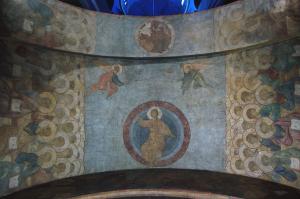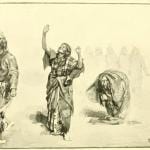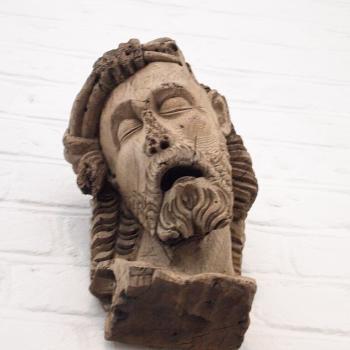
On the Byzantine Catholic calendar, Meatfare Sunday, the Sunday which commemorates the Second Coming of Christ and the Great and Dreaded Tribunal of the Last Judgment,comes to remind us that the Great Fast is more than about fasting, it is also a time for alms, a time to increase our charity towards our neighbor. Fasting without charity does little to no good. Whether we eat or not, by that act alone, we do not find ourselves any closer or further away from God. “Food will not commend us to God. We are no worse off if we do not eat, and no better off if we do” (1 Cor. 8:8 RSV).
Fasting is meant to help us gain control of ourselves, to learn self-discipline. But not all self-discipline is good. It must be ordered towards charity. Without charity, our discipline can lead us astray, for we are nothing without love.
As we grow in love, we will then grow in our walk with Christ. For what we do for others out of love, especially for those in need, we do for Christ. Likewise, if we close ourselves off from those in need, we risk sinning against Christ, as Paul understands: “Thus, sinning against your brethren and wounding their conscience when it is weak, you sin against Christ” (1 Cor 8:12 RSV). For this reason, when discussing the Last Judgment, Jesus makes it clear: what we do to others, especially to the least among us, we do him. “And the King will answer them, `Truly, I say to you, as you did it to one of the least of these my brethren, you did it to me’” (Matt. 25:40 RSV). Likewise, when we fail to help those in need, we stand against Christ and risk perdition:
Then he will say to those at his left hand, `Depart from me, you cursed, into the eternal fire prepared for the devil and his angels; for I was hungry and you gave me no food, I was thirsty and you gave me no drink, I was a stranger and you did not welcome me, naked and you did not clothe me, sick and in prison and you did not visit me.’ Then they also will answer, `Lord, when did we see thee hungry or thirsty or a stranger or naked or sick or in prison, and did not minister to thee?’ Then he will answer them, `Truly, I say to you, as you did it not to one of the least of these, you did it not to me.’ And they will go away into eternal punishment, but the righteous into eternal life” (Mat. 25:41 -46 RSV).
When Paul talks about eating or not eating so that we do not offend those we are with, he emphasizes charity over personal piety and scruples. It is that charity which we need to possess if we want the Great Fast to be for our own spiritual good. It does no good to engage an extreme fast if we have hate in our heart or if we look down upon those in need. Jesus, talking about the Last Judgment, said that the judgment would be based upon what we did in relation to charity. Just because we call him Lord does not mean we respect him or love him like we should. If we love him, our lives will reflect that love as we will love others. For when we love others, we show our love for him. But any lack of concern for those in need shows we really have yet to open ourselves up to him. Indeed, St. Catherine of Siena writes, it is this charity, not spiritual reflection in and of itself, which he wants from us; if we do not seek him in and with such charity, we will find ourselves deprived of him:
So they offend me more by abandoning charity for their neighbor for a particular exercise or for spiritual quiet than if they had abandoned the exercise for their neighbor. For in charity for their neighbor they find me, but in their own pleasure, where they are seeking me, they will be deprived of me. Why? Because by not helping they are by that very fact diminishing their charity for their neighbors. When their charity for their neighbors is diminished, so is consolation. So, those who want to gain lose, and those who are wiling to lose gain. In other words, those who are willing to lose their own consolation for their neighbors’ welfare and gain me and their neighbors, if they help and serve them lovingly. [1]
The Last Judgment will be a reflection of our relationship with Jesus during our life. If we devote ourselves to a life of charity, St. Hilary of Poitiers points out, we will be judged worthy by Christ. If we do not, we risk his rebuke:
He will establish those on his throne who are worthy according to their goodness or wickedness. He shows that he is with the least of his children: those who serve him with the attitude of his humility, who feed him with those who hunger, who give him a drink with those who thirst, those who invite among the strangers, and who clothe him with those who are naked, and who visit him with those who are sick, and who comfort him with those who are distressed. He is transfused with the bodies and minds of believers everywhere such that those devoted services to humanity may deserve grace, whereas their refusal provokes rejection.[2]
It is important to note that Jesus indicates that many people will be surprised with the result of the judgment because they did not realize what their relationship with Jesus truly was like. This shows us that it is not gnosis which saves us, but love, for love is what opens us up to Christ and his grace. Jesus is the savior, but knowing that doesn’t make us saved, just as not knowing it in any extrinsic sense does not mean we are not in a relationship with Christ, open to his grace, and capable of being saved (cf. Matt. 25:37-40).
If we want to be saved, if we want to gain the most we can out of the Great Fast, our focus should not be on the fasting and fasting regulations (however useful they can be), but on the charity which should grow in us during the Great Fast. Many people can fast for all kinds of reasons (such as wanting merely to lose weight), but charity, once it is embraced, cuts through all selfishness and is able to take all forms of self-discipline as tools to generate better forms of charity. Indeed, when used properly, fasting can help train us to renounce all selfish pursuits which get in the way of our charity. For through fasting, we should learn how to live our life without focusing on every little desire which enters our heart. If we do not learn this, then even our love can be impeded as we turn it into an object of our selfishness, as Hadewijch explains:
But nowadays Love is very often impeded, and her law violated by acts of injustice. For no one wishes continually to renounce his emotional attractions for the honor of Love. All wish to hate and to love at their own pleasure, and to quarrel and be reconciled in accordance with their whims, not in accordance with the justice of brotherly love. They also depart from justice out of human respect; this is also a personal learning. And they destroy justice by anger; this is a passion from which many ills take their rise. [3]
Discipline helps us transcend our selfish, individualistic approach to the world; the Great Fast, then, is meant to help us generate love even as it teaches us how to overcome all selfish attachments which can get in the way of a pure love. With the Sunday of Meat-Fare, the day traditionally meant to be the last day meat was consumed before Easter, we are given the proper orientation for the Great Fast. We are reminded that love itself is the most important element of our spiritual journey. And, for those who need to have reasons to give to others, we need to remember: “Whatever human mercy gives on the way, divine mercy repays in the heavenly country.”[4]
Lastly, if God is love (and he is), and if love is the basis by which the last judgment will be determined (and it is, according to Matthew 25), then Jesus himself, who is the reflection of that love, must give himself to those who are in judgment, so that they have an opportunity to repent and be saved. For love desires the salvation of those who are lost. And that is what Jesus does. As St. John Chrysostom indicates, our final judgment will not be rendered before Jesus has had a chance to plead his case to us:
But while the brutes have from nature their unfruitfulness, and fruitfulness, these have it from choice, wherefore some are punished, and the others crowned. And He does not punish them, until He has pleaded with them; wherefore also, when He has put them in their place, He mentions the charges against them.[5]
It is easy to think of the Last Judgment in a strict legalistic sense. This is because it is a judgment. But as the judgment is grounded in love, it is not some legalistic exercise but rather an unveiling of who we are for all time. Jesus will show us who we are, and where we stand in relationship with him. Have we opened ourselves up to him in love or have we not? Jesus is clear: the results of the judgment, what is unveiled, can be a surprise. For many who thought they were with Jesus might find themselves to be far from him, while those who thought they were far from him, will find they truly were with him all along.
When we begin the Great Fast, we must remember that we will come face to face with Jesus and he will judge us. We should use the time given to us wisely. We must develop within us as much love as is possible. That is what we must focus on during Lent. For without love, our fasting can end up being in vain.
[1] St. Catherine of Siena, The Dialogue. Trans. Suzanne Noffke (New York: Paulist Press, 1980), 131.
[2] St. Hilary of Poitiers, Commentary on Matthew. Trans. D.H. Williams (Washington, DC: CUA Press, 2012), 267.
[3] Hadewijch, “Letter 12” in Hadewijch: The Complete Works. Trans. Columba Hart OSB (New York: Paulist Press, 1980), 71.
[4] St. Caesarius of Arles, Sermons. Volume I. trans. Mary Magdeleine Mueller (New York: Fathers of the Church, 1956), 128 (Sermon 25).
[5] St. John Chrysostom, “Homilies on the Gospel of St. Matthew” in NPNF1(10):475 (Homily lxxix).
Stay in touch! Like A Little Bit of Nothing on Facebook.
If you liked what you read, please consider sharing it with your friends and family!













